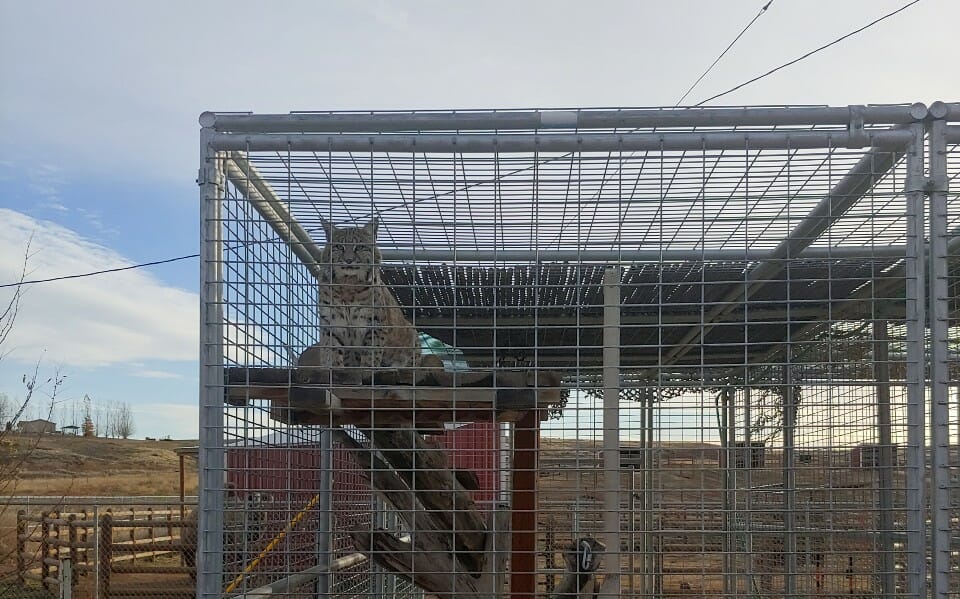A popular Idaho petting zoo reportedly serving people with disabilities that faced allegations of chronic and ongoing animal abuse from several former employees turned up a mostly clean slate following an inspection and investigation by state authorities.
But public records documents showed that Babby Farms, located at 5900 El Paso Road in Caldwell, had issues with permitting and required documentation in 2021 and also racked up multiple issues of noncompliance during past inspections, including insufficient pest control and animals kept in crowded cages and fed improper diets.
In November, several former seasonal employees alleged that multiple animals were left in substandard conditions in a petition written by Gabrielle Derry, who worked seasonally at Babby Farms in Summer 2021 and said she “witnessed animal mistreatment to the extreme.”
“Many animals died and management has done nothing to mitigate this cruelty,” Derry wrote. “I, and other staff members, witnessed these animals suffering but no matter how much the staff spoke up, our voices were never heard.”
Babby Farms told Lady Freethinker via Facebook in November that the facility provides good homes for its animals.
“The accusations being made about Babby Farms are not accurate,” Babby Farms said. “Babby Farms provides its animals great homes and care. Inspection records from multiple state and federal agencies reflect that.”
A majority of the animals kept at the farm – a total of 107, according to the zoo’s last inspection by the U.S. Department of Agriculture (USDA) on July 22 – are exotics, including spider monkeys, bobcats, caracals, camels, coati, kangaroos, sloth, lemurs, otters, a gibbon and even a zebra and a yak, although the facility also hosts domestic animals, such as guinea pigs, goats, pigs, and sheep, according to the USDA inspection records.
Since the allegations made headlines, the USDA has told Lady Freethinker (LFT) that no medical issues were observed by Inspector Brian Hood during his yearly visits.
A November 5 site visit, involving officials with the Idaho Department of Fish and Game (IDFG) and the Idaho State Department of Agriculture (ISDA), found “no real problems,” although they noted several animals who were overweight or had wounds, according to documents obtained by LFT via public records request.
Those public records also show that Babby Farms appears to have operated in 2021 without the state-required large-scale commercial facility permit and also had not submitted required annual documentation, including an inventory of its current animals, birth and death records, and an annual veterinary certificate of inspection.
The facility also has had issues with permitting and animal care in the past, according to the documents.
Babby Farms and parent nonprofit Trace, Inc., did not respond with further comment for this story.
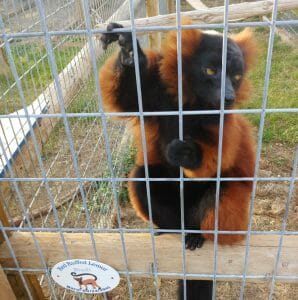
A red ruffed lemur at Babby Farms (Courtesy of Idaho Fish and Game)
Allegations of Abuse and Multi-Agency Inspection Results
Babby Farms — which has a 4.4 star average rating from more than 400 Google reviews and more than 4,700 followers to its Instagram account — charges admission fees of $11 for adults and $8.50 for seniors and children to access their grounds and animals, most of which are “hand-raised” for these interactions, according to prices and information listed on the website in November.
The zoo is open to the public Tuesday through Sunday, from 9 a.m. to 5 p.m., from May 1 through September 30 each year, according to the website.
Carly Beach, a former Babby Farms employee, told CBS2 that she considered the conditions for animals at the farm “disgusting” and “unacceptable.”
“They spent our summers telling us to bond with these animals, and then you go back the next year as an employee, as a guest, and they’re dead,” she said.
Derry, who spoke with Lady Freethinker by telephone in November, said she is studying to become a wildlife biologist and took seasonal employment with Babby Farms for the experience with animals.
She said she was particularly concerned about several animals whose well-being allegedly seemed to decline while she was there, including a binturong – also known as a bearcat – who allegedly went from being “energetic and super playful” to being euthanized after management allegedly ignored her requests for medical attention for the animal.
“She wouldn’t move, she didn’t want to eat,” Derry said. “Anytime we would tell someone, it was ignored.”
Alleged mistreatment as reported by Roadside Zoo news and within the Change.org petitions – which covered the most recent allegations, as well as allegations specific to otters, kangaroos, and puppies, and collectively amassed more than 32,000 signatures at the time of this story’s publication – include that animals reportedly were primarily fed discarded and rotting produce from grocery stores; that numerous animals allegedly died unnatural deaths, sustained preventable injuries, or went without needed medical treatment; that nonhuman primates like lemurs and capuchins did not receive proper care or enrichment and resulted to self-mutilating or stereotypic behaviors like rocking back and forth; and that animals allegedly have bitten staff and visitors on several occasions.
Derry said she and other seasonal employees want to see conditions drastically improved at Babby Farms – or for the facility to be shut down.
“This place could be amazing, but right now, it’s only amazing for the people who come by, not the animals,” she said. “We’d love for this place to stay open if they can change, but we don’t see that happening and we think these animals would be happier elsewhere.”
Babby Farms took to social media on Nov. 1, saying in a Facebook post that “nothing has mattered more to any of us than the health and well-being of all our animals.”
“Long-term employees of Babby Farms have spent the last decade traveling and training around the world to learn as much as possible about the needs of the exotic animals we house and love,” Babby Farms wrote. “We invite anyone to visit the public records of the federal and state government organizations governing animal health and welfare.”
The Babby Farms poster had limited comments on that Nov.1 post, and on the afternoon of Friday, Nov. 12, the facility deleted its Facebook page.
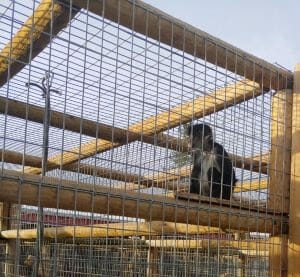
A spider monkey sits inside an enclosure at Babby Farms (Courtesy of Idaho Fish and Game)
On Nov. 5, ISDA and IDFG officials arrived at Babby Farms and conducted an inspection in which “no real problems” were found, according to public records documents. The ISDA report noted inspectors saw limited fecal matter and odor throughout, that enclosures provided adequate space, and that all animals appeared to have appropriate enrichment, food and water.
ISDA inspectors reported that all animals appeared to be healthy, although they also wrote that several animals were overweight or obese, including a black-capped capuchin, a black-handed spider monkey, five binturong, five brushed-tailed bettongs, an iguana, a North American porcupine, an otter, and a bobcat.
Other issues included that an otter named Yang appeared “timid,” bobcat Bob had been declawed, a Eurasian eagle owl was housed in an enclosure “with minimally sufficient size”, a female red kangaroo “presented with mild stereotypic behavior,” a lemur had a wound on his hand, a llama “exhibited some age-related muscle wasting”, a donkey had a leg issue, a yak had matted fur, a white miniature horse had worn teeth, and a coatimundi sported a lesion on his leg, according to the ISDA report.
Records from the Gem County Sheriff also indicate deputies noted animals showing signs of lameness but that the veterinarians on site had dismissed these issues as not requiring additional attention.
“We walked the entire property and after speaking to the doctors it was apparent that there were no concerns for animal neglect,” the deputies wrote. “There were a couple of very old animals that showed some signs of being lame; however, the doctors stated that this would be normal due to their age.”
Sheriff records also indicate that Babby Farms staff “are getting death threats on the office phone/hateful messages and people driving by yelling threats and flipping off employees.”
Richard Bell, with the USDA’s press team, reviewed photos submitted to Lady Freethinker from the seasonal employees regarding visitor-animal interactions and said there were no noncompliance issues with the fencing.
“There is an 8 foot high perimeter fence surrounding the facility,” he said via email. “The public can, with an attendant present, have contact with some of the animals, mainly hoof stock and small primates.”
Bell said Babby Farms has a working program of veterinary care with the Treasure Valley vet clinic, and that nonhuman primates have the required environmental enrichment plan. He added that the USDA inspector, whom he said had gone through both classroom and field training required by the department, had never witnessed injuries or suspicious deaths.
“The inspector has never witnessed untreated medical issues,” Bell said. “The animal deaths have occurred over a four-year period and were identified during the daily observations and reported to the attending veterinarian. No pacing or behavior issues have been identified during the inspections.”
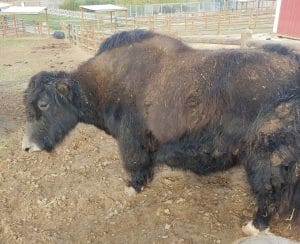
A yak inside an enclosure at Babby Farms (Courtesy Idaho Fish and Game)
Problems with Permitting and Past Inspections
ISDA told Lady Freethinker via email that Babby Farms has valid possession permits for all of its animals on file with their office.
But emails and a letter to the farm from Fish and Game, obtained via public records request, showed the facility hadn’t submitted its required annual documentation in 2021 – including an animal inventory, a list of animals who were born or died, records of receipts of sale/export/transport of animals, and an annual veterinary certificate of inspection – or obtained a proper large-scale commercial permit.
“IDFG will be working with Babby Farms over the next ten days to get their reporting and permitting requirements current,” IDFG staff wrote in a Nov. 8 email obtained via public records request.
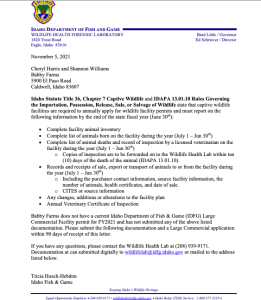
Public Records from Idaho Department of Fish and Game showing Babby Farms lacks proper permits.
Babby Farms also has had concerns and issues related to animal welfare in the past.
The USDA’s Animal and Plant Health Inspection Service (APHIS), responsible for overseeing whether licensees’ animal welfare conditions meet requirements of the federal Animal Welfare Act (AWA), has inspected Babby Farms eight times since 2014. APHIS Inspector Brian Hood, who conducted all eight inspections, cited noncompliance on two of those visits for a total of five violations classified as “non-critical.”
Noncompliance documented during a March 11, 2014 inspection included a dark residue buildup on the roof of an otter den box and signs of rodent droppings in a dry food storage area, according to USDA reports.
Issues cited during a May 10, 2016 inspection included an inadequate amount of shade in a sheep and goat exhibit, a pig whose belly was reportedly one inch from rubbing on the ground and was “slowly walking in a labored effort with a waddling gate [sic]” due to an improper diet, and a mineral block sunk into the ground that was “halfway covered with hay and yard litter” in an enclosure housing Sika deer and kangaroo, according to USDA reports.
Records from the Idaho State Department of Agriculture, which oversees conditions for animals considered hazardous or “deleterious,” and from the Idaho Department of Fish and Game, which oversees wildlife not on the deleterious list, show additional issues of noncompliance.
In 2015, a concerned individual wrote in about allegedly appalling conditions for animals, including small cages, children grabbing and smacking animals, and sick animals, according to public records documents. Agriculture officials who investigated noted in their reports that three baby lemurs and bush babies were kept in cages of inadequate size, that Babby Farms’ permits don’t allow the facility to breed animals but that several intact animals were on-site, and that the facility needed to improve security to keep predators out.
Inspectors also noted that the facility’s housekeeping “needs some improvement,” citing a dog crate in a Paca pen that was found crawling with maggots, excess fecal material in enclosures, flies, food waste, carcasses left in enclosures, water troughs that had algae and debris in them, and puncture vines and discarded equipment present within animal exhibits, according to the public records documents.
“The facility is generally unkempt,” the inspector wrote. “Many of the exhibits have excessive fecal material and food debris within them. Most of the exhibits have water troughs that contain algae and debris.”
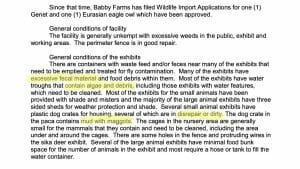
Excerpt from an Idaho State Department of Agriculture Report from a 2015 inspection of Babby Farms (Obtained via public records request)
But the ISDA inspector added, “I found the animals to be in good condition and well-adjusted. They were provided with furnishings to entertain themselves and all had adequate shelter.”
A bobcat, kookaburra, and several tortoises and turtles who were present on-site also didn’t have the needed importation permits on file, according to the report. IDFG, in its report from 2015, concluded that “the conditions present during the inspection violate the terms and conditions under which the facility operates for its license.”
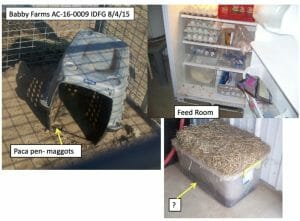
Maggots in a Paca pen during a 2015 inspection at Babby Farms (Courtesy Idaho Fish and Game)
Animal import documents, obtained from IDFG via public records request, show several of Babby Farms’ import permit applications for otters were denied in 2016 after state officials found the animals had been transported to Idaho before receiving the required veterinary approval.
In an official letter to Babby Farms, the agency wrote, “This is the latest in a series of events that are outside the terms and conditions” and said the animals needed to be turned over to the state.
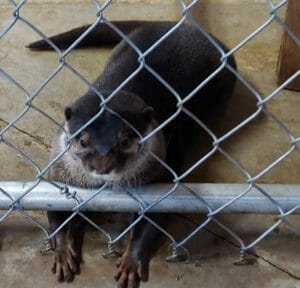
Otter Yang at Babby Farms (Courtesy Idaho Fish and Game)
Claims of Serving People With Disabilities
Babby Farms’ website notes that the zoo is open to all members of the public for the same admission fee, regardless of their ability status, and cites undisclosed studies that “show all people, disabled or not, benefit from hands-on interaction with animals.”
This statement differs from what’s listed on the tax forms for Trace Inc, the parent nonprofit of Babby Farms, which notes the organization “operates a zoo as a vocational training facility,” according to the 990s.
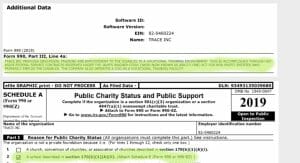
Screenshot Trace Inc 990s from 2019 (Accessed via Internal Revenue Service Charity Navigator)
The representative of Babby Farms who spoke with Lady Freethinker via Facebook messenger did not immediately respond to questions about the number of people with disabilities who have been vocationally trained at Babby Farms.
The representative also did not immediately answer questions about the program in place to vocationally train individuals with disabilities at the farm.
Derry, the seasonal employee, said she “only saw two people with disabilities” during her time at Babby Farms and that they reportedly were engaged in picking up leaves. She added that she and the other employees who spoke up against Babby Farms also allegedly did not receive much training.
“We didn’t get trained,” she said. “We had to figure it out ourselves.”
Much of the funding for Trace Inc – whose net assets topped $ 21.6 million in 2019 and whose stated mission on its annual tax filings is “to provide education, training and employment to the disabled” – comes from federal service contracts reserved under the Javits Wagner O’Day Act for nonprofit entities who primarily employ the disabled, according to Trace’s 990s.
That Act, overseen by the Ability One Commission, requires that at least 75 percent of total direct labor hours must be performed by “persons who are blind or have significant disabilities” to qualify.
The Ability One Commission told Lady Freethinker via email that Trace Inc has not diverted any funds to Babby Farms and that the Commission therefore has no records of Babby Farms acting as a “vocational training facility” for the disabled.
Documents provided by the Commission showed that Trace Inc employed 700 people with disabilities across 18 military bases and government facilities in FY 2020, with contracts for mainly shelf stocking, custodial, landscaping and warehousing services adding up to about $25 million.
The Commission provided a sole document from 2012 showing that Trace Inc met the requirement that “75 percent of work be done by people with severe disabilities or blindness,” which reported 160,873 direct labor hours by 61 people with “severe disabilities,” including one who was blind, according to the public records documents.
BoiseDev has formerly reported that Trace Inc is not a Community Rehabilitation Partner with the Idaho Division of Vocational Rehabilitation or accredited with CARF International, an organization that accredits health and human services nonprofits required by the State of Idaho to receive state grants.

